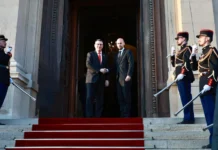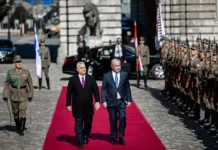As most Americans focused on Super Bowl Sunday last month, nearly 600 Iranian Jews gathered at the West Hollywood Temple Beth El to mark 50 years since the death of Solaiman Haiim, one of their community’s greatest scholars.
The name Haiim may not mean much to Americans or even most American Jews, but in Iran he was a legend, respected by Jews and non-Jews alike for creating the first English to Farsi and Farsi to English dictionaries. At the start of the 20th century, when Iran was modernizing and many Iranians were gaining higher education overseas, Haiim’s comprehensive two-volume dictionary was an invaluable resource, helping hundreds of thousands of students overcome the language barrier.
While Haiim is still remembered and honored in Iranian Jewish circles, however, the Iranian regime has done everything in its power to erase his legacy. Haiim’s life story is something that must be kept alive for the new generation of Iranians.
Haiim was born in 1887 in the poverty-stricken Jewish ghetto in Tehran to a religious Jewish family. His early education was in the maktab, or a grade school, but he later attended the Etehad High School in Tehran, established by the French Jewish non-profit organization “Alliance Israélite Universelle.” The Alliance was created in 1860 by affluent Jewish philanthropists in Europe to provide a Western education to Jews living in Muslim lands.
After graduating from the college in 1915, Haiim became a full-time teacher at the college and single-handedly began work on an English-Farsi dictionary. His first, smaller dictionary received praise from students and scholars, but beginning in the 1920s, it became obvious there was a need for a more comprehensive work due to Western governments’ business and diplomatic activities in the country. Haiim worked nearly 18 continuous hours per day to complete this more comprehensive English to Farsi dictionary, finally completing it in 1929. It was published in two expansive volumes.
Frank Nikbakht, an Iranian Jewish activist who heads the Los Angeles-based Committee For Minority Rights in Iran, said Haiim’s dictionaries transformed the lives of thousands of Americans in Iran and Iranian students in United States and England after World War II.
“The Haiim dictionary, which had been the sole bridge between Farsi and English languages in the pre-war period, became the most important tool of communications between Iranians and the English-speaking world as English became the lingua franca of the entire world,” said Nikbakht.
Haiim was considered a great mind not only for his dictionaries, but also because of his fluency in Farsi, English, French, Hebrew and Arabic. His other written works include a book on the Persian grammar; a 1961 Hebrew-Persian dictionary; poems in various Persian forms and styles, plays and essays; and other literary and philosophical texts. Aside from a love of writing, Haiim also adored music and played both the violin and a Persian string instrument known as the tar. Haiim not only composed his own music but also enjoyed singing.
Interestingly, Haiim’s dictionaries were not only created by a Jew, but also published and sold by Jews—the Berookhim family of Tehran. The popular two-volume Haiim dictionaries also proudly displayed the Jewish menorah on each cover.
In later years the publishing rights to Haiim’s surviving works were transferred to the Farhange Mo-aser, or “Contemporary Culture Publication,” which edited and published almost all of his dictionaries. Later in life, Haiim began to write a Farsi-Hebrew dictionary, but was not able to complete it due to his failing health and subsequent death on Feb. 14, 1970, in Tehran of a heart attack.
The Farsi-Hebrew dictionary project was placed on hold for many years, but was revived in 2001 by Haroun Yashayai, the former president of the Tehran Jewish Committee, who hired Iranian Jewish scholars to complete the work.
While the Iranian regime and its radical Islamic apparatus for the past 40 years have tried to erase Haiim’s name and contributions to academia in Iran because of his religion, Iranian American scholars say his dictionaries have and will continue to have for many years to come positive ripple effects for Iranian society.
“For generation … these dictionaries from Haiim were inseparable companions to every traveler to and from Iran,” said Dr. Jaleh Pirnazar, a professor of Persian language at U.C. Berkley. “Thousands of student global travelers, business people and tourists alike depended on Haiim’s major contribution to Iran’s step into the age of modernity. The availability of his dictionaries at home and abroad facilitated communication, exposure to and better understanding of the Western world, concepts of modernity and open horizons for the citizens of Iran from all walks of life.”
While newer, more expansive Farsi-English dictionaries have been published in the past few decades in Iran, Iranian American scholars believe these newer works are still inferior in quality to Haiim’s original two-volume dictionary because they lack correct translations and also word pronunciations. For their part, Haiim’s family and Iranian Jewish activists in Southern California said they will continue their efforts to educate the new generation of Iranians living in Iran and elsewhere about Haiim’s remarkable legacy.
Karmel Melamed is an award-winning and internationally published journalist based in Southern California.


























